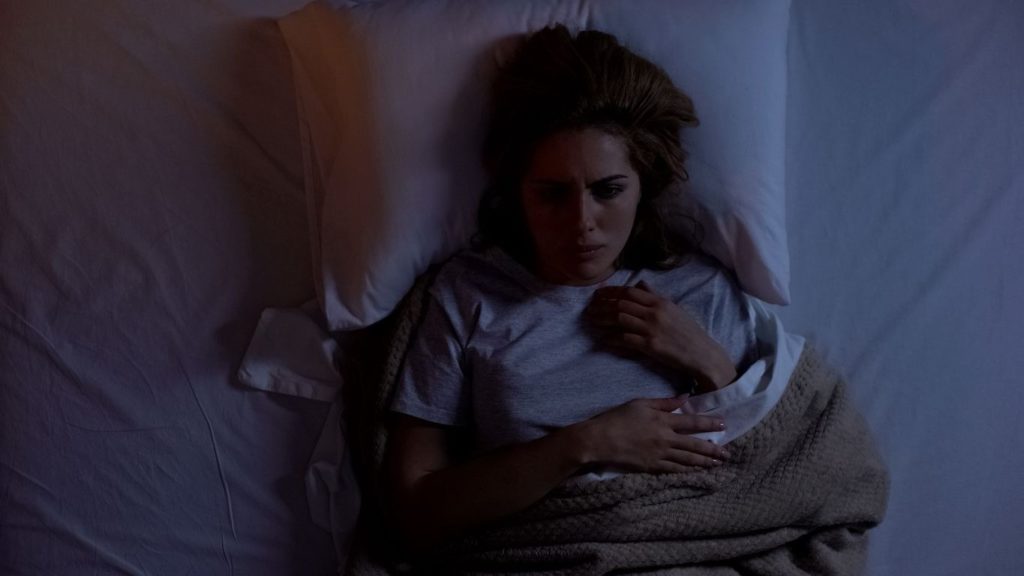Why do we breathe harder at night?
Caution : You must consult your doctor for your health. This page presents only a personal and alternative point of view which should not be considered as an attempt to prescribe medicine.
Sleep and breathing are essential functions for the proper functioning and survival of the body.
During sleep, the respiratory rate drops like other body functions.
However, it continues to play its role to guarantee vital functions.

Sleep is broken down into several phases to which specific respiratory rhythms correspond.
Having a strong or noisy breathing at night, during sleep, is often associated with breathing problems or other more or less serious illnesses.
We present here different causes of this physiological phenomenon.
Sleep and nocturnal breathing
To better understand why we breathe hard at night, it is necessary to know the course of sleep, and the respiratory rhythm that accompanies it.
Sleep is broken down into several phases which follow one another during the night.
These are: wakefulness, slow sleep and REM sleep.
Each of these phases contains several cycles and has its specific respiratory rhythm.
This causes variations in breathing.
During slow sleep, all of the body's functions hit their lowest level.
Ditto for breathing.
This is the part of sleep where we actively recover from accumulated fatigue.
On the other hand, during REM sleep, there is a strong brain activity, and the body functions are active.
So the brain is using more oxygen at this precise moment, and your breathing is no longer low, but fairly normal.
It is during this phase of sleep that we have dreams.
Some studies have shown that the functioning of the brain during REM sleep is almost identical to that of the waking brain.
Thus, agitated breathing can occur at night, and it is necessary to identify the cause, in order to find a solution.
Causes of heavy breathing
If you have regular strong breathing during the night, this implies respiratory dysfunction, the presence of disease or a physiological change.
There are many causes of heavy nighttime breathing.
Snoring
Snoring is a disorder that manifests itself by the reduction in the volume of the airways during sleep.
The passage of air causes a tremor or vibration of the uvula and soft palate.
It is these vibrations which are at the origin of the strong and sound breathing.
Sleep apnea
The sleep apnea is a respiratory disorder characterized by short pauses in breathing during the night.
Most often, it is caused by weak tongue and throat muscles, but mainly from stress.
Thus, they obstruct the respiratory ducts; these are released due to their lack of tonicity.
People with the disease exert considerable effort to breathe.
The presence of large tonsils is also a cause.
The volume of these glands disrupts the normal passage of air from the nostrils to the lungs.
The same phenomenon occurs when the tongue is abnormally large.
This may be due to a birth defect.
In addition, the symptoms of sleep apnea are: anxiety, fatigue upon waking up, headaches, snoring, heavy breathing during the night.
Also, note that snoring caused by apnea is not to be confused with ordinary snoring: snoring is not necessarily synonymous with sleep apnea.
There are basically three forms of sleep apnea.
There is obstructive sleep apnea syndrome (OSAS), central sleep apnea (ACS), and mixed sleep apnea.
Obstructive sleep apnea (OSA) is characterized by the obstruction of the air ducts during sleep.
This obstruction can be partial or total.
It is the most common form of sleep apnea.
Central sleep apnea mainly concerns people with disorders of the central nervous system.
Indeed, the brain does not allow the process of breathing.
This may be the breath command message that is not sent to the muscles.
Mixed apnea, as the name suggests, is a combination of the first two forms of sleep apnea.
Other causes
Colds, bronchitis or respiratory allergies also cause chaotic breathing at night.
Respiratory disorders can be more or less serious depending on their origin.
A mild or transient illness will only require simple drug treatment or breathing techniques.
These techniques are generally inspired by relaxation therapies such as yoga, and help alleviate the concerns of heavy breathing.
On the other hand, if you suffer from sleep apnea, it is best to see a doctor or do some breathing exercises to see if it relieves your breathing problem.
❤ The ultimate guide to breathing
Intermittent Breathing : Discover the method to quickly relieve your anxiety and chronic fatigue (positive effects from the first use).Read also :
Previous article : Why do we breathe less well at altitude?
Next article : Breathing problem after stopping smoking: the solutions?

